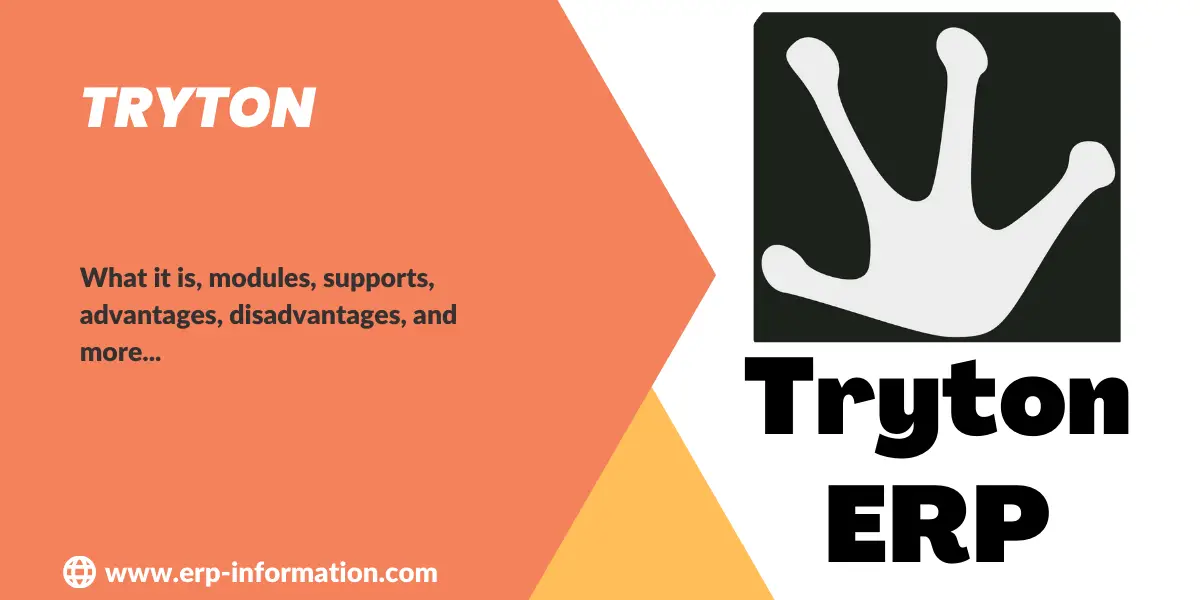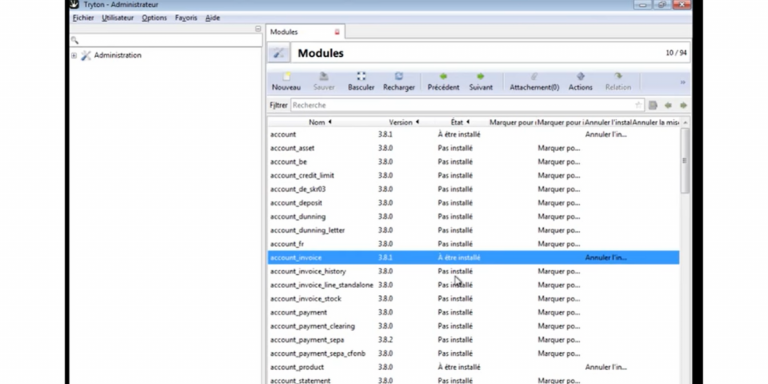Tryton ERP is a robust enterprise resource planning solution designed to streamline business operations and enhance productivity across various industries. This overview will explore the key features and functionalities of Tryton ERP, providing insights into how it stands in comparison to other popular ERP solutions. Additionally, we will identify the specific industries that can significantly benefit from implementing this versatile software.
From its flexible architecture to extensive customization options, Tryton ERP caters to diverse business needs. Understanding its implementation process, common challenges, and how to tailor the system to fit unique requirements will empower organizations to make informed decisions. Moreover, we’ll delve into the support and community resources available to users, ensuring a smooth transition to this innovative ERP system.
Overview of Tryton ERP

Tryton ERP is a robust open-source enterprise resource planning solution designed to meet the diverse needs of businesses across various industries. With its modular architecture and customizable framework, Tryton provides businesses with the flexibility to adopt features that suit their operational requirements while enhancing overall productivity. The core functionalities of Tryton ERP include comprehensive modules for financial management, sales, inventory control, project management, and human resources.
Each module is designed to integrate seamlessly, enabling users to manage all aspects of their business from a single platform. The system’s user-friendly interface and extensive documentation further enhance its usability, making it accessible for users of all technical backgrounds.
Key Features and Functionalities
Tryton ERP includes a wide range of features tailored to streamline business processes. Key functionalities include:
- Modular Design: Allows users to select and implement only the necessary modules as per their business needs, enhancing flexibility and scalability.
- Multi-Language and Multi-Currency Support: Facilitates global operations by supporting multiple languages and currencies, making it suitable for international businesses.
- Comprehensive Reporting: Offers extensive reporting tools that enable businesses to analyze data effectively, improving decision-making processes.
- Workflow Automation: Helps automate routine tasks, reducing manual effort and increasing efficiency across various departments.
- Community Support: Being open-source, it has an active community that contributes to continuous improvements and innovation.
Comparison with Other Popular ERP Solutions
When comparing Tryton ERP with other popular ERP solutions such as SAP, Oracle ERP, and Microsoft Dynamics, several distinct advantages emerge:
- Cost-Effectiveness: Tryton ERP is open-source, meaning businesses can avoid hefty licensing fees associated with proprietary solutions, making it a more budget-friendly option.
- Customization: With its modular approach, Tryton allows for extensive customization, enabling businesses to tailor their ERP system to specific needs without being locked into a rigid framework.
- Community-Driven Development: The vibrant community around Tryton encourages frequent updates and innovative enhancements, which may not be as prevalent in proprietary solutions.
- Ease of Implementation: Tryton’s design simplifies the implementation process compared to more complex ERP systems that often require extensive training and onboarding.
Target Industries Benefiting from Tryton ERP
Tryton ERP serves a variety of industries, making it a versatile solution for many business types. Some of the target industries include:
- Retail: Facilitates inventory management, sales tracking, and customer relationship management.
- Manufacturing: Supports production planning, supply chain management, and quality control.
- Service Industries: Ideal for project management, resource allocation, and billing processes.
- Healthcare: Manages patient records, billing, and inventory of medical supplies.
The adaptability of Tryton ERP across these diverse sectors underscores its effectiveness in enhancing operational efficiency and supporting growth in various business environments.
Implementation Process of Tryton ERP

Implementing Tryton ERP is a pivotal step for businesses seeking to streamline their operations and enhance productivity. A structured approach is essential for a successful implementation, which involves several critical phases. Understanding these phases can help organizations navigate the complexities of ERP deployment more effectively.The implementation of Tryton ERP involves a series of interconnected steps that ensure a smooth transition from existing systems to the new ERP environment.
These steps typically include project planning, requirement gathering, system configuration, data migration, user training, and system testing. Each phase has its own significance and contributes to the overall success of the project.
Steps Involved in the Implementation Process
The following steps Artikel the essential components of a successful Tryton ERP implementation:
1. Project Planning
Define the scope and objectives of the ERP project, allocate resources, and establish a timeline.
2. Requirement Gathering
Collaborate with stakeholders to identify and document the specific needs and functionalities required within the ERP system.
3. System Configuration
Customize and configure Tryton ERP modules based on the collected requirements, ensuring alignment with business processes.
4. Data Migration
Plan and execute the transfer of existing data into the new system, ensuring data integrity and consistency.
5. User Training
Conduct training sessions for end-users to familiarize them with the ERP functionalities and promote effective usage.
6. System Testing
Perform rigorous testing to identify bugs or issues before going live. This phase ensures that the system meets all specified requirements.
7. Go-Live and Support
Launch the ERP system and provide ongoing technical support to address any post-implementation challenges.
Common Challenges and Solutions
During the implementation of Tryton ERP, businesses may encounter several common challenges. Recognizing these challenges early and having strategies to address them can significantly enhance the success rate of the project.
Resistance to Change
Adopting sap r3 can transform how your organization manages its resources and processes. This enterprise resource planning software is designed to facilitate better coordination and decision-making, ultimately leading to improved productivity. By leveraging its capabilities, businesses can gain a competitive edge in an ever-evolving marketplace.
Employees may be hesitant to adopt new systems. To mitigate this, involve them in the planning process and emphasize the benefits of the new system.
Data Quality Issues
Poor data quality can hinder the implementation process. Conduct thorough data cleansing before the migration phase to ensure accuracy.
Underestimating Time and Resources
Organizations often underestimate the time and resources required for a successful implementation. Establish a realistic project timeline and allocate adequate resources from the outset.
Inadequate Training
Insufficient training can lead to user frustration. Comprehensive training programs should be developed to ensure all users are confident in using the new system.
“The success of an ERP implementation largely hinges on the preparation and commitment of the entire organization.”
Implementation Checklist for Businesses
Preparation is crucial for a successful Tryton ERP implementation. The following checklist serves as a guide for businesses to ensure they are ready for deployment:
Define Project Goals
Clearly articulate what the organization aims to achieve with the implementation.
The integration of erp prestashop can significantly enhance your business operations by streamlining various processes. This system provides a robust framework that supports inventory management, sales tracking, and customer relationship management. By utilizing such advanced solutions, companies can ensure they operate more efficiently and effectively.
Gather Stakeholder Input
Include input from various departments to capture a comprehensive view of requirements.
Assess Current Infrastructure
Evaluate existing IT systems and infrastructure to determine compatibility with Tryton ERP.
Budget Allocations
Set a detailed budget that covers software costs, training expenses, and potential unforeseen issues.
Establish a Project Team
Form a dedicated team that includes project managers, IT staff, and key personnel from relevant departments.
Create a Timeline
Develop a realistic timeline that Artikels each phase of the implementation process.
Plan for Change Management
Prepare strategies to manage the organizational change that accompanies ERP implementation.
Develop a Testing Strategy
Artikel how testing will be conducted to ensure system functionality prior to the go-live date.By following these structured steps and preparing adequately, businesses can enhance their chances of a successful Tryton ERP implementation, ultimately leading to improved operational efficiency and business growth.
Customization and Extensions in Tryton ERP
In today’s dynamic business environment, organizations often require tailored solutions to meet their unique operational needs. Tryton ERP, being an open-source platform, offers extensive customization and extension capabilities that empower businesses to adapt the system to their specific requirements. This flexibility is essential for companies that must stay agile while managing their resources effectively.Customization in Tryton ERP can be achieved through various methods, allowing companies to modify existing functionalities or add new features that align with their workflows.
This adaptability ensures that businesses can optimize their processes without compromising on efficiency or performance.
Ways to Customize Tryton ERP
There are several methods to customize Tryton ERP, which include:
1. User Interface Modifications
Users can modify the layout, colors, and overall design of the user interface to better suit their preferences and improve usability. This can enhance the user experience and increase productivity.
2. Business Logic Adjustments
Customizing the business logic allows organizations to implement specific rules that govern how data is processed within the ERP system. This ensures that the software aligns perfectly with the company’s operational procedures.
3. Integration with Third-Party Applications
Tryton ERP can be integrated with various third-party applications, enabling organizations to extend its functionalities. This is essential for businesses that rely on multiple software solutions.
4. Custom Reports and Dashboards
Users can create tailored reports and dashboards that provide insights relevant to their specific operational metrics. This facilitates informed decision-making and performance tracking.
5. User Roles and Permissions
Customizing user roles and permissions enables organizations to control access to sensitive information and functionalities, ensuring compliance with internal policies and regulations.
Popular Extensions Available for Tryton ERP
Tryton ERP supports a vibrant ecosystem of extensions that enhance its capabilities. Below are some notable extensions and their functionalities:
Tryton Accounting
This extension offers comprehensive accounting features, including invoicing, financial reporting, and tax management. It helps organizations maintain accurate financial records with ease.
Tryton Inventory Management
This extension provides tools for managing inventory levels, stock movements, and order tracking. It enables businesses to optimize inventory control and reduce carrying costs.
Tryton Project Management
With this extension, users can manage projects from initiation to completion, including task assignment, resource allocation, and progress tracking. It is vital for organizations that rely on project-based work.
Tryton CRM
This extension helps businesses manage customer relationships by providing functionalities for tracking leads, managing contacts, and analyzing customer interactions to enhance service delivery.
Tryton eCommerce
This extension integrates Tryton with eCommerce platforms, allowing businesses to manage online sales, product listings, and customer orders seamlessly.
Guide to Developing Custom Modules for Tryton ERP
Developing custom modules for Tryton ERP enables businesses to tailor the system further to their precise needs. The following steps Artikel the process of creating a custom module:
1. Setup Development Environment
Establish a development environment by installing Tryton and its dependencies. Ensure you have a version of Python and PostgreSQL that is compatible with Tryton.
2. Create Module Structure
Use the command-line tools provided by Tryton to generate the basic structure of your custom module. This typically includes directories for models, views, and translation files.
3. Define Models
In the `models.py` file, define the data models that represent the custom functionality. This involves specifying fields, relationships, and any constraints required for your business logic.
4. Create Views
In the corresponding `views.xml` file, design the user interface components that will interact with your models. This includes forms, lists, and related views that enhance user experience.
5. Implement Business Logic
Write the necessary business logic in Python to handle data processing and interactions between models. This includes methods for data validation, calculations, and other operations specific to your module.
6. Testing and Debugging
Rigorously test your custom module to ensure it functions as intended. Utilize Tryton’s built-in testing tools and framework to identify and rectify any issues.
7. Documentation
Provide comprehensive documentation for your module, detailing its functionalities, installation instructions, and usage guidelines to facilitate ease of use for other users.
8. Distribution
Package your module appropriately for distribution within your organization or the broader Tryton community, ensuring that all necessary dependencies and instructions are included.By following these steps, businesses can effectively develop custom modules that enhance the functionality of Tryton ERP, ensuring it meets their specific operational needs and objectives.
Community and Support for Tryton ERP

The Tryton ERP community plays a vital role in the successful implementation and utilization of the software. It offers various resources that cater to the needs of users, developers, and businesses looking to maximize their experience with Tryton ERP. The community fosters a collaborative environment where individuals can seek help, share knowledge, and contribute to the growth of the platform.
Resources for Community Support
The Tryton community provides a wealth of resources for users seeking support. These resources include forums, mailing lists, and chat channels that enable users to ask questions and share experiences. The following resources are particularly noteworthy:
- Tryton Mailing Lists: Users can subscribe to various mailing lists tailored to different topics, including development, user support, and announcements. This facilitates ongoing discussions and updates.
- Tryton IRC Channel: Available on the Freenode network (#tryton), this real-time chat platform allows users to communicate instantly with other community members and developers.
- Tryton Forum: The official forum serves as a dedicated space for users to post questions, share solutions, and engage with others interested in Tryton ERP.
Contributing to the Tryton ERP Community
Contributing to the Tryton community not only helps improve the software but also enhances personal and professional growth. Users can contribute in several ways, each with its own set of benefits:
- Development Contributions: Developers can contribute code, bug fixes, or new features. This involvement can hone technical skills and increase professional visibility.
- Documentation Improvements: Enhancing user documentation or creating tutorials helps others navigate the system more easily. This can promote a sense of accomplishment and community spirit.
- Participating in Events: By attending or organizing events such as conferences or meetups, users can network with peers, share insights, and learn best practices.
“Contributing to the community not only aids personal development but enriches the entire ecosystem.”
Training Resources and Documentation, Tryton erp
In addition to community support, a variety of training resources and documentation are available for users of Tryton ERP, enabling them to maximize their utilization of the software. Key resources include:
- Official Documentation: Comprehensive user manuals and developer guides are available on the Tryton website, covering installation, configuration, and usage of various modules.
- Video Tutorials: A selection of video tutorials offers step-by-step guidance on specific features and modules, making it easier for visual learners to grasp complex concepts.
- Workshops and Webinars: Regularly scheduled workshops and webinars provide users with hands-on training and expert advice, enhancing their understanding and operational efficiency.
These resources collectively contribute to a well-rounded support system for all Tryton ERP users, ensuring they have access to the help and information needed to succeed in their implementation and use of the software.